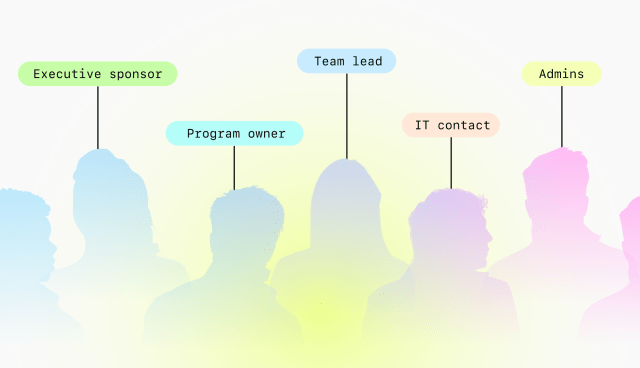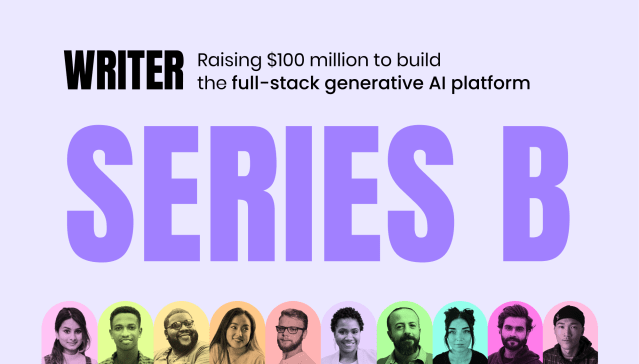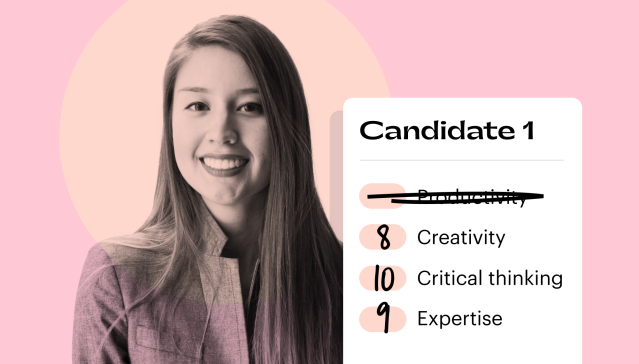Inside WRITER
– 13 min read
Women at WRITER: Transforming tech by blazing a trail into the AI era

Women have always been underrepresented in tech. We’ve seen wave after wave of promised tech change and progress fail to move the needle. But the generative AI revolution might be different.
At WRITER, we’ve seen firsthand that women are taking the lead in creating and implementing strategies for generative AI. They’re the ones who are actively driving the changes and transformations in this field in academia, in research and development, and in enterprise organizations. With the rise of generative AI, the gap between imagination and reality is narrowing. This groundbreaking technology empowers more women to become builders and leaders in the tech sector.
- Women in tech have faced underrepresentation and lack of respect, but WRITER is actively empowering women through a women-forward team and events that highlight successful women in the industry.
- Support and mentorship are crucial for women in tech, with great mentors advocating for them and providing honest feedback.
- Women in male-dominated fields must overcome industry assumptions and biases, proving their expertise and competence.
- Imposter syndrome and the struggle to seek help and support are challenges for women in tech, but embracing vulnerability can lead to personal and professional growth.
WRITER has built a women-forward team that’s backed and advised by successful women. As we celebrate Women’s History Month, we’re proud to host our first Women’s Day Celebration event, where we platform the remarkable women driving change in the industry. Seven incredible women joined us to share their experiences and insights on the dynamics of being women in male-dominated fields. By highlighting successful women in tech and offering mentorship programs, we can create an environment where more women are motivated to pursue careers in technology. This support system helps them overcome challenges they may face on their journey.
To start, our CEO and co-founder May Habib interviewed a group of WRITER advisors and investors about their careers. Then, we held a Q&A with a panel of women in senior leadership roles at WRITER.
We recognize that it’s our responsibility to shine a spotlight on the women behind the scenes if we truly want to contribute to a meaningful change that increases the representation of women in tech.
The following lineup of panelists shared their experiences and insights on the dynamics of being women in male-dominated fields:
- May Habib, CEO and co-founder of WRITER
- Doris Jwo, director of product management at WRITER
- Maiko Cook, VP of operations at WRITER
- Allison Vatz, senior director of enterprise sales at WRITER
- Jamie Barnett, advisor and investor at WRITER
- Jennifer Fonstad, co-founder and managing partner of Owl Capital
- Whitney Bouck, managing director at Insight Partners
Support and mentorship for women in tech
The number of women in tech decreases the further you climb the career ladder, which is reflected in the limited amount of support and mentorship opportunities. The power of mentorship and the need for supportive environments are vital if we want to continue our efforts to empower women in the tech industry.
Great mentors will advocate for you and offer truthful feedback about your weaknesses. Jamie Barnett emphasizes that these are the two most important qualities to look for in a mentor.
“The first necessary quality is somebody who’s really going to push you and not hold you back,” Barnett said. “The second one is [being] super honest with you. Not a lot of people are going to tell you what your shortcomings are. If you can find those people, that’s a huge gift.”
This type of leadership that supports and encourages you is crucial, echoes Whitney Bouck. Experiencing the opposite can be detrimental to your career.
“Having a boss that empowers you and can champion for you is so important. I don’t think you can really appreciate that until you’ve had a few bosses, and maybe even seen a bad one,“ Bouk said. “I remember the time when I was at [an IT consulting firm], where I had this fabulous boss. When he got promoted into something else, the guy who took over just enjoyed bullying and shaming people in public and didn’t understand anything about what I did. I finally decided life is too short to have bad bosses who don’t believe in you. It was how I took power of my own career, and said, ‘I’m out.’”
Despite the ongoing imbalance in the industry, Whitney is hopeful about the future of equality and opportunity in tech.
“I think over the last 15 or 20 years, there’s been an emergence of all this attention on the fact that women are a minority in boardrooms, in executive ranks, and in overall tech employment. There’s been so much rise of support and attention that didn’t exist in the 80s and 90s, and even early 2000s,” Bouk said. “It may still feel like we have a very long way to go, but I feel like we have a much more recognized support system in place to help women rise through the ranks and follow their own choice of path.”
Overcoming industry assumptions that women are less capable than men
Most women unfortunately have an anecdote about being perceived as “lesser than” in the workplace when compared to their male counterparts. The endless stream of stories proves that we must continue to challenge gender biases and stereotypes in the tech industry.
Allison Vatz shared a personal experience of being underestimated and facing skepticism from male clients. She also highlighted the importance of proving oneself through expertise and competence.
“As a female in enterprise sales, there’s always an assumption that you don’t know what you’re talking about,” Vatz said. “I remember my first year at Slack, I was an IC (individual contributor) and I went on-site to a super old-school healthcare company. I was with my solutions engineer, who was also a woman. The team we were presenting to was a highly technical audience of CISOs and CIOs. It was all men, we were the only two women. We finished up the meeting and the guy who had invited us looked at us and said, ‘Wow, you two really know a lot about IT.’ We both looked at each other giggling on our way out, like, ‘Yeah, we aren’t idiots. We do work for this company, we’ve learned the product, we know the industry, we know the market, we know the buyer.’ ”
That was just one of many similar experiences Vatz would have in her career, and she isn’t alone.
Maiko Cook offered up a comparable story where she and her female senior vice president would have to sometimes invite male colleagues into the room just to be taken more seriously.
“When I first switched from investment banking to principal investing, it was all a small group, all men, but I was hired by a 29 or 30-year-old Indian woman who was already an SVP. She had an interesting way of navigating the space. She won a lot of respect from her colleagues and showed me how to just be really good at what you’re doing,” Cook said. “She was also aware of the world that we’re in. Sometimes, companies would come in and if they wanted to meet with us, she’d tell us, ‘I know this team, we’re going to need to bring some gray hair into this meeting.’ She was 29 or 30 and I was 23 or 24, so we’d pull in one of the partners or managing directors in the same group to just sit in. He was an older man in his 60s with gray hair who had no idea about stuff in the tech industry, but he’d sit in the room with us.”
These examples point to the unspoken bias against women in male-dominated spaces and industries — and the need not only for more women in leadership roles, but also for more male advocates to create space for their female counterparts.
Dealing with imposter syndrome
There’s a huge difference in behavior and mindset between men and women when it comes to faking confidence and seeking help. Asking for help and support is can be a double-edged sword for some women in the workforce — on one hand, it’s necessary for anyone to advance in their career. Even the most accomplished industry leaders must seek guidance and support.
On the other hand, asking for help can play into stereotypes about women being “helpless” or “incapable,” so women can overcompensate by taking everything on themselves and rarely seeking assistance.
May Habib explained how she’s seen firsthand how willing men are to ask other men for help, while it can be harder for women to do the same.
“We could be in line at school drop-off, and my husband would be behind me. Within three minutes, he and another guy — they haven’t even exchanged names — and they’re literally talking about how they can help each other on something,” Habib said. “I feel like with women, you could be at an executive dinner with C-level executives, and you’re dancing around that ‘Hey, how can you help me at work’ question. Instead you’re deepening these relationships. I’m not saying one is better than the other, but it is so different and really feels like a very gendered realm.”
Maiko Cook discussed how when she was younger in her career, she’d be less likely to give her opinion.
“I didn’t feel like I understood something unless I really understood it and knew how every piece worked. If you’re in investing, you look around and you realize that people who are investing don’t understand how stuff works,” Cook said. “I think it’s that gradual realization when you’re in rooms or talking about something you’re like, ‘Oh, I actually know more than most of the people in here.’ You still have to get over that uncomfortableness of sometimes being like, ‘I’m going to ask stupid questions I don’t understand.’ I have enough faith in my own intelligence that if I don’t understand this, it’s because someone hasn’t communicated it well. And so I’m gonna ask and pick at it. But it is uncomfortable.”
Jennifer Fonstad approached the notion of imposter syndrome from a different perspective, highlighting that feeling like an “imposter” can be a good thing for growth.
“There’s a lot of data out there that shows that men fake it ‘till they make it. They may only have 20% of knowledge, but they pretend to have 100% knowledge,” Fonstad said. ”Women feel like they’d have to have at least 80% knowledge before they’ll pretend they have 100% knowledge … To push yourself past the imposter syndrome I think would be a mistake. You should actually always be a little bit uncomfortable with where you’re at. If you think you’re doing a perfect job, why aren’t you making a mistake and not learning enough? So that helps push you and advance your thinking and challenge you to ask, ‘What is it that I need to do to keep going?’”
Vulnerability makes us human
Emotions and vulnerability are meant to be shared, not hidden. Emotions should be used to strengthen and build relationships. Despite the prevailing stereotype that “women are more emotional than men,” we should be championing this part of us that makes us human.
Allison Vatz shared that she was once met with the question, “do you think you’re being too emotional about it?” after telling her male boss about an instance when a colleague disrespected her. This experience made her see her boss in a new light, but it didn’t deter her from valuing emotions.
“People who don’t respect the way someone else feels — or the way that they feel like they’ve been treated — are just not worthy of anyone’s time. Though they may have gotten to the point that they’re at in their careers now, I think the world is definitely changing and more aware of people like that,” Vatz said. “I don’t think in the long run, those are the types of people who’ll be successful. There’s a level of how you want to show up to work, but I personally don’t believe that you shouldn’t be yourself or have the emotions that you have just because you’re a woman. If anything, I think it helps people relate to you more if you do have emotions, like we’re not just like walking blank heads walking around.”
Work relationships become more valuable when emotions are shared, said Doris Jwo. For her, vulnerability and openness make it easier to support one another.
“I’m really fortunate to have a lot of women in my life who are actually product managers as well. I think a big part of how we support each other is just being really open and vulnerable about things that are going on, the challenges that you’re dealing with, and the struggles between balancing personal things with work things,” Jwo said. “And that’s something that I like seeing in work relationships as well, is ‘What’s underneath the surface? What are the things that people worry about and are concerned about?’ Perfection doesn’t really exist, so what’s underneath that? It’s so valuable to understand all those pieces and layers because it makes you feel like you’re not alone. Then you can talk about how you deal with it, and what your tactics are, and how you should think about that, and just feel like you have some support on the front.”
Empowering women to lead in AI
Our WRITER Women Day celebration showcases the power of women in tech and the positive impact they can make when given the opportunity and support they deserve. As CEO of WRITER, May Habib is very intentional about bringing women into the journey of generative AI with her, as she’s seen how many of the champions and believers among the WRITER customer base are women.
“When you think about the amount of bridge building, brokering, change management, and how to make generative AI successful, it’s the woman doing the work,” Habib said. “Our ability to reflect that market in the team that we build, and be able to bring AI to market in a way that respects what makes humans human beings — we have to build a really big female presence on this team. It’s going to be critical to our success to reflect the people doing the change at the customer. We are different than the men, we’re better at building coalitions.”
If you’re a woman in tech and would like to work with more inspiring women to build the future of AI, check out our careers at WRITER.




